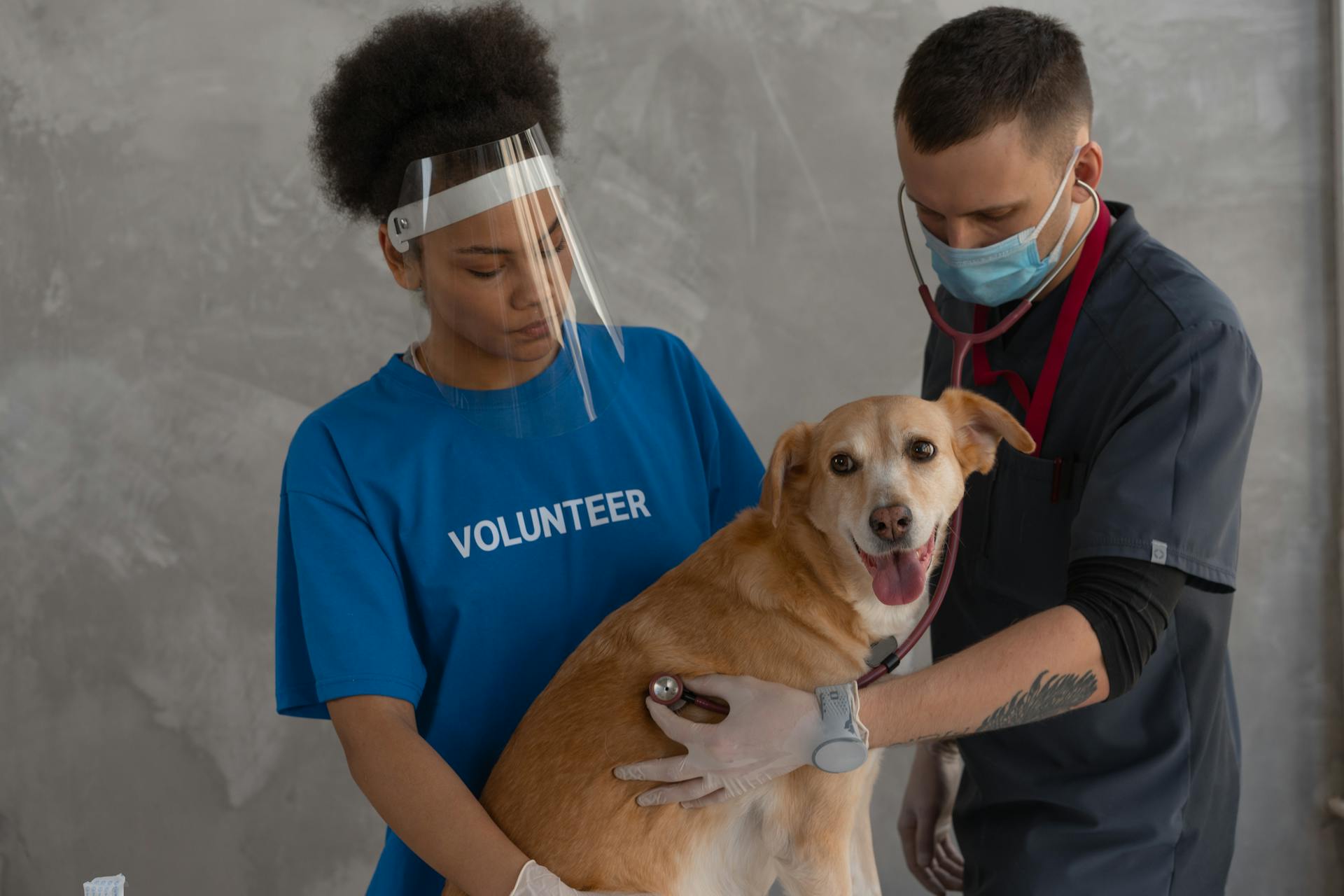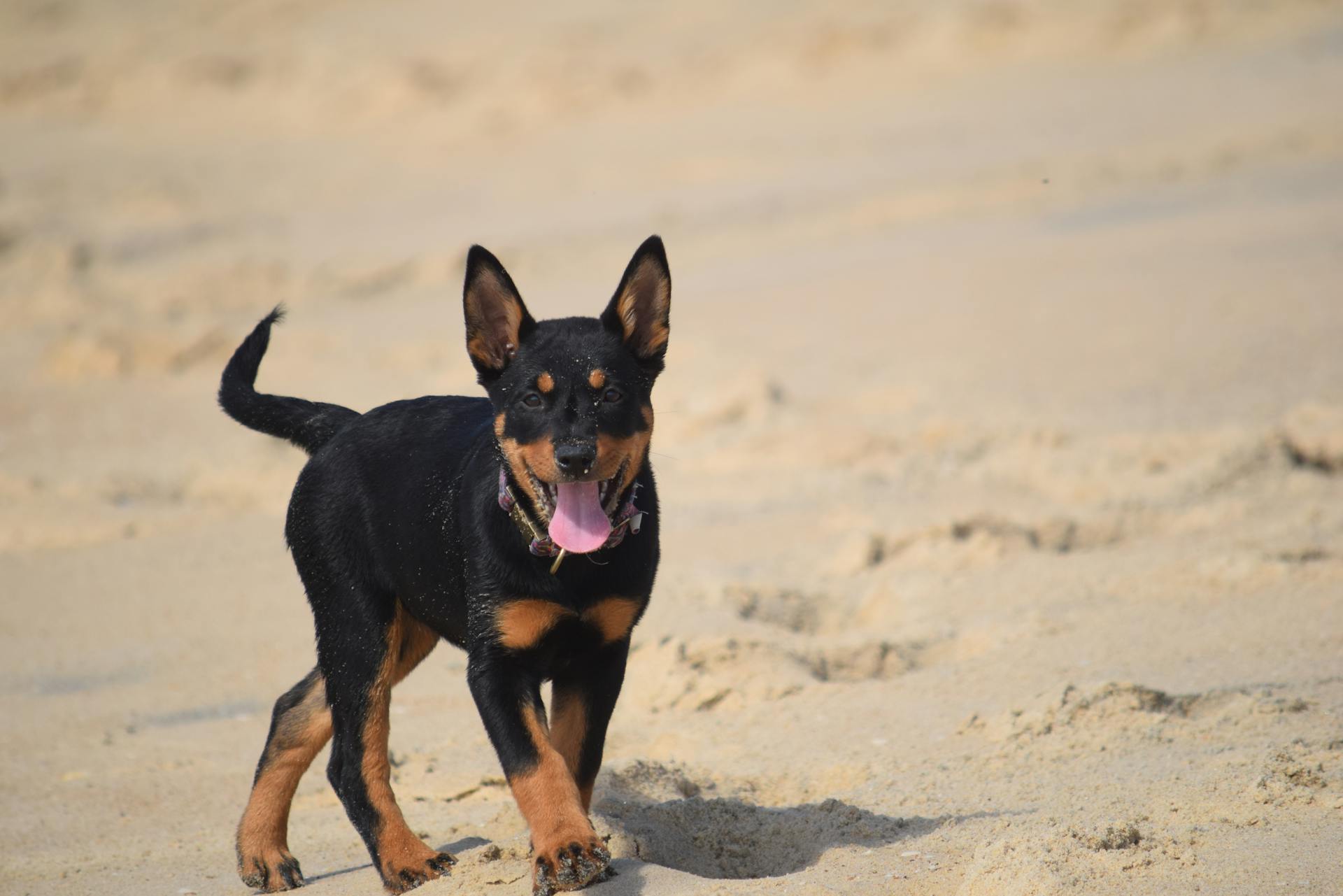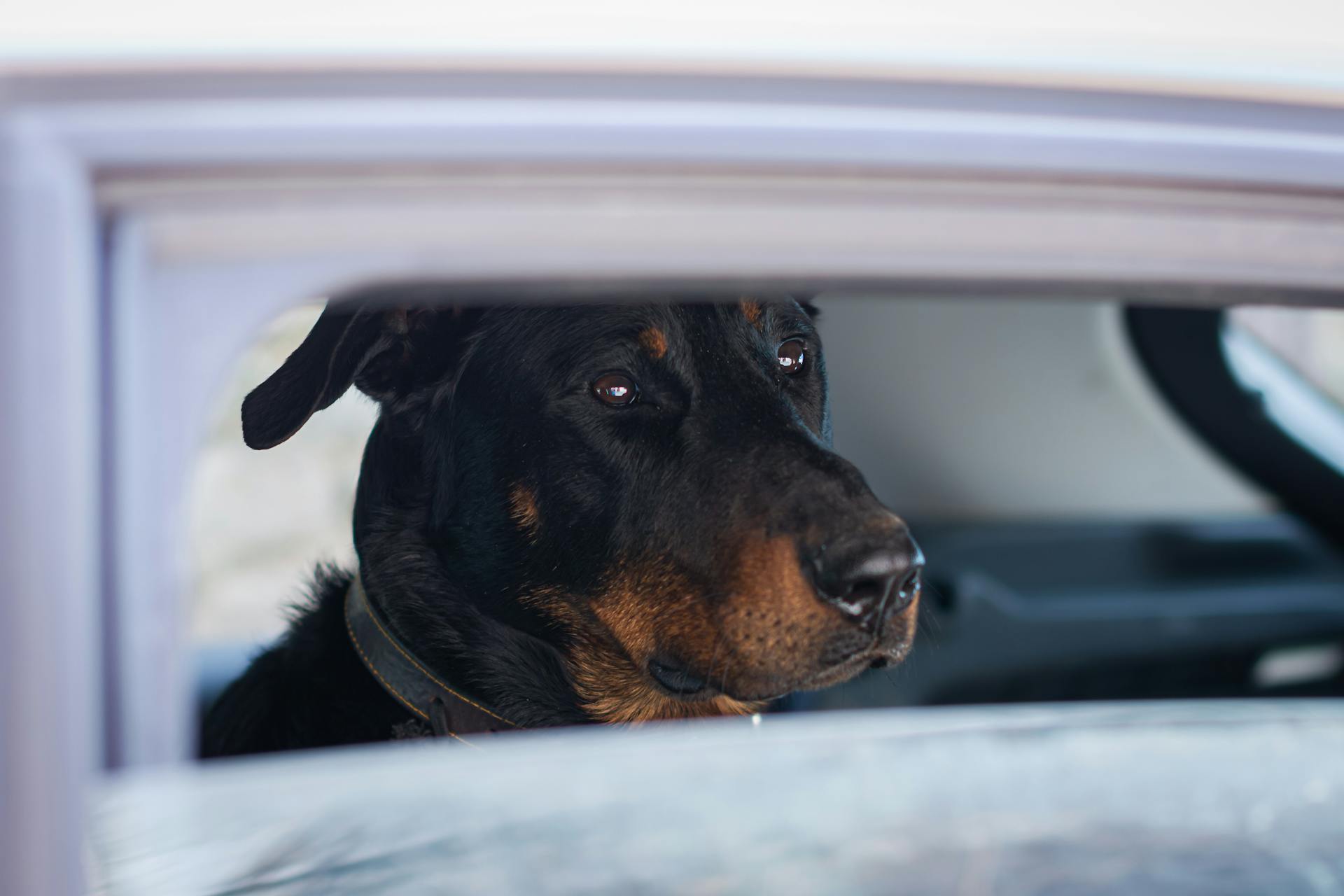
The Beauceron is a relatively healthy breed, but like all breeds, they can be prone to certain health issues. Hip dysplasia is a common issue in the Beauceron, which can lead to arthritis and mobility problems if left untreated.
Hip dysplasia is often inherited from the parents, so responsible breeding practices are crucial to minimize the risk. A good breeder will have their breeding stock evaluated for hip dysplasia and only breed dogs with good hip scores.
The Beauceron's eyes are also prone to problems, including cataracts and progressive retinal atrophy. Regular eye exams can help detect these issues early on, and responsible breeding practices can help reduce the risk.
Regular veterinary check-ups and a healthy lifestyle can go a long way in preventing or managing Beauceron health issues.
For your interest: Morkie Health Issues
Hip Dysplasia and Prevention
Hip dysplasia is a hereditary disease that can be prevented by selecting reproducers carefully.
It's essential to know the status of the hips of animals you want to reproduce and their predecessors' ancestors, if possible. This includes evaluating the hips' integrity of reproductive subjects through organizations like the Orthopedic Foundation for Animals (O.F.A.) and the Pennsylvania Hip Improvement Program (PennHIP).
A unique method for measuring joint laxity of the hip is PennHIP, which is quantitative and gives a measure of angle. This is unlike other methods that are qualitative or subjective.
The result of PennHIP is a number between 0 and 1, with a lower score indicating less laxity and a lower risk of dysplasia. A dog with a score of 0.3 or less is considered free from hip dysplasia.
Health Issues and Care
Hip dysplasia is a major health problem in Beaucerons, with 12% of the breed affected according to the Orthopedic Foundation of America. Elbow dysplasia is also a concern, affecting 4% of the breed.
Beaucerons are prone to eye diseases such as progressive retinal atrophy (PRA), cataracts, and eyelid abnormalities like entropion and ectropion. These can lead to vision loss and discomfort for the dog.
Allergies are another issue in Beaucerons, causing itchy skin that can lead to bacterial skin infections like pyoderma. A vet may need to run tests to determine the underlying cause of the allergies and rule out environmental or dietary factors.
A different take: Dog Health Issues by Breed
Allergies
Allergies can be a real challenge for some breeds, and a vet may need to carry out tests to figure out what's causing the conditions.
These tests typically involve examining a dog's environment and diet to identify any potential allergens.
A dog's environment can be a significant contributor to allergies, so it's essential to consider this when trying to determine the cause of the issue.
Regular check-ups with a vet can help identify any potential allergies early on, making it easier to develop a plan to manage them.
Dilated Cardiomyopathy (DCM)
Dilated cardiomyopathy, or DCM, is a serious heart disease that can affect Beaucerons. It's an acquired condition, meaning it develops over time, and it occurs when the heart becomes enlarged and can't function properly.
One of the first signs of DCM is often a heart murmur, which your veterinarian can detect during a check-up. A heart murmur is an abnormal sound heard when listening to the heart with a stethoscope.
A different take: When Should You Give Your Dog Flea and Tick Medicine
If your veterinarian suspects DCM, they may recommend a canine Cardiopet proBNP blood test to measure heart function. This test can help determine if heart disease is likely, and if so, what additional testing is needed.
Severe DCM symptoms can be distressing and even life-threatening, and may include rapid heart rate, cough, difficulty breathing, lethargy, loss of appetite, collapse, weight loss, and even death.
Canine Copper-Associated Hepatitis
Canine Copper-Associated Hepatitis is a rare condition that affects Beaucerons, causing copper to accumulate in their liver and lead to oxidative damage and inflammation.
This condition can be asymptomatic in some dogs, but others may display weight loss, vomiting, decreased appetite, seizures, jaundice, and fluid-filled abdomen.
Blood work, an abdominal ultrasound, and liver biopsy with special staining are needed to diagnose this condition.
Treatment varies based on the degree of liver disease and may include medications and a special prescription diet.
Buying and Caring for a Beauceron
If you're thinking about buying a Beauceron puppy, it's really important to contact a breeder or person who screens their dogs and has a well-planned breeding program in place.
Beaucerons are herding dogs that need to expend their energy through mental and physical stimulation, or they can be destructive if left to entertain themselves. An adult Beauceron should receive at least two hours of exercise daily.
To minimize the excessive shedding, you should brush your Beauceron once or twice weekly. Beaucerons come in four color combinations: black and tan, gray-black and tan, black and rust, and harlequin Beaucerons (black and tan coats with bluish-gray patches).
Here are the four Beauceron color combinations:
- Black and tan
- Gray-black and tan
- Black and rust
- Harlequin Beaucerons (black and tan coats with bluish-gray patches)
Buying a Puppy
If you're thinking about buying a Beauceron puppy, it's really important to contact a breeder or person who screens their dogs and who has a well-planned breeding programme in place so that any litters they produce are less likely to inherit any congenital disorders from their parents.
Beaucerons can thrive in various living situations, but they do require regular exercise to stay happy and healthy.
Before bringing a Beauceron puppy home, make sure you have the time and resources to provide them with the proper care and attention they need.
Beauceron puppies are naturally curious and energetic, so they'll need plenty of opportunities to run around and play outside.
Caring for a
Caring for a Beauceron is a big responsibility, but with the right approach, you'll be rewarded with a loyal and loving companion.
Beaucerons are herding dogs that need to expend their energy through mental and physical stimulation, so they require at least two hours of exercise daily.
They have a double coat made of short, dense fur, and there are four Beauceron color combinations: black and tan, gray-black and tan, black and rust, and harlequin Beaucerons with bluish-gray patches.
Beaucerons are prone to excessive shedding, so brushing them once or twice weekly can help minimize the fur in your home.
Take a look at this: Black Mouth Cur Health Issues
To keep your Beauceron healthy, it's essential to provide regular veterinary care, including vaccinations and booster shots. You should also consider spaying or neutering your dog, as current research suggests that this can impact their future health.
Here are the four Beauceron color combinations:
- Black and tan
- Gray-black and tan
- Black and rust
- Harlequin Beaucerons (black and tan coats with bluish-gray patches)
By following these guidelines and providing proper care, you can help your Beauceron live a long, healthy life.
Raising a Healthy Dog
If you're thinking of buying a Beauceron, it's essential to contact a reputable breeder who screens their dogs and has a well-planned breeding program in place.
Beaucerons are herding dogs that need to expend their energy through mental and physical stimulation, so early training is a must to prevent destructive behavior.
Their double coat sheds excessively, so brushing them once or twice a week can help minimize the fur in your home, regardless of their color.
Beaucerons should be fed a large-breed puppy formula until they are 1 year old and then transitioned to a large-breed adult formula.

To minimize the risk of bloat or GDV, feed your Beauceron two to three meals a day, rather than one meal, and avoid exercise one hour before and after a meal.
A senior diet should be started around 6-7 years of age, and it's crucial to follow the feeding guidelines on the dog food packaging and consult with your veterinarian to determine the proper portion size.
Here are some additional tips to ensure your Beauceron receives the right nutrition:
- Put the food bowl on the floor at mealtimes; do not use elevated bowls.
- Feed your dogs separately to minimize stress if there are multiple dogs in the house.
- Do not add water to the dry food, especially if it contains citric acid.
- Do not overfeed your Beauceron.
- Use a slow feeder bowl if your Beauceron eats quickly.
Frequently Asked Questions
What are the cons of owning a Beauceron?
Beaucerons may be prone to joint issues, eye problems, and gastric torsion, which can lead to significant health concerns. Owning a Beauceron requires careful consideration and regular veterinary check-ups to mitigate these potential risks
Sources
- https://www.elevagetibone.com/beauceron_health.html
- https://www.pets4homes.co.uk/pet-advice/health-issues-more-commonly-seen-in-the-beauceron.html
- https://www.petmd.com/dog/breeds/beauceron
- https://www.yourpurebredpuppy.com/health/beaucerons.html
- https://www.gooddog.com/breeds/beauceron/health-testing-guide
Featured Images: pexels.com
